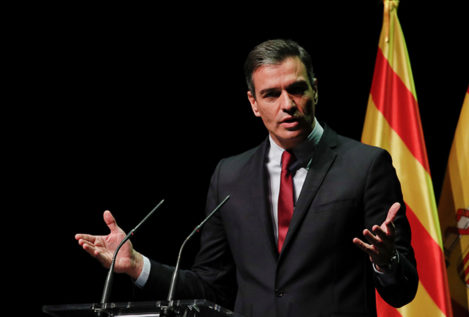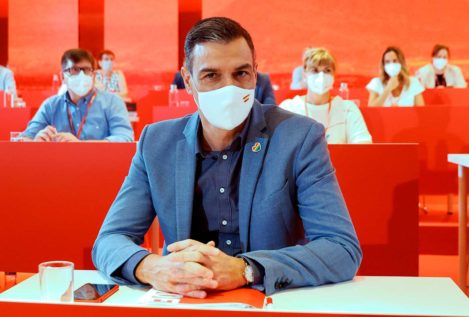If it Bleeds, it still Leads
«With the Communist faction of the Government neutered and becoming increasingly irrelevant, Sanchez still needs to find a way to pivot towards the centre if he is going to win the snap election»

Ballesteros | EFE
As expected, the Spanish PM has reshuffled his cabinet. Gone are his loyal and ideologically orthodox, albeit generally incompetent and in some cases, even possibly corrupt, advisors. In with the new, out with the old quite literally as the new ministers are younger and more capable on paper. The slow burner intervention of Spain’s government by its creditors is taking shape ahead of the possible disbursement of EU Next Generation Funds. As is the case in other periphery countries, the Communist ministers have not been touched for two reasons. First, they are still useful to Sánchez who is not quite ready yet to call a snap election. Secondly, they wield no real power, and when they do try to do some further damage to the economic recovery, such as their minimum wage increase proposal, they are easily sidelined as their salaries and pensions are far more important to them than their principles. They are Marxists indeed, but of the Groucho faction. This instinct to cling to the trappings of power is not unique to Spanish far left politicians; the Five Star Movement in Italy led the way with a most Italian pragmatic approach to preserving sinecures.
Those who believe that the overhaul of Sanchez’s inner circle is a welcome change should curb their enthusiasm. Sanchez referred to the opportunity for growth and renewal presented by the EU’s New Generation Funds as «The Great Leap Forward». Whoever writes his speeches is either a comic genius or as ignorant of history and all other subjects as his boss. In any case, the Euro Group got their wish for a technocratic government led by the Deputy Prime Minister Nadia Calviño who is far more popular in Brussels than she is in Spain. This is because most businesses have receive very little help from Government funds even as they were forced to shut down, unconstitutionally, as we now find out when it no longer matters. The strings that come attached to EU funds will make it nearly impossible for most employers to access any of these funds. They will go straight into the pockets of the shareholders of the large bureaucracies that were set up by the large Engineering and Construction companies and other Government contractors to profit from twenty-five years of EU development funds.
The lesson not learned from that experience is that when you invest tens of billions of euros in low return or duplicitous infrastructures, productivity growth does not improve. Worse yet, somebody, usually taxpayers, are left holding the bag for maintenance costs for decades. Take 5G network deployment; operators seem to be waiting for these funds before they start their rollouts. On a recent high-speed train trip from Madrid to Malaga, we noticed that Vodafone’s signal starts deteriorating just 10 minutes outside Madrid when 4G service became first 3G, then E. A self-respecting country would take back their license and their spectrum for not meeting minimum service quality requirements, not in this case. It would appear that the regulator has chosen Britain as the benchmark for service quality instead of the average EU market. In other parts of the world, RENFE, the high-speed train operator would have perhaps taken the initiative of providing Wi-Fi service on the train. Providing their customers with data connectivity would be seen as an aggressive intrusion into another industry. Customer service is an alien concept in the medieval mind-frame of protected gilds that appears to drive Spanish business practices.
With the Communist faction of the Government neutered and becoming increasingly irrelevant, Sánchez still needs to find a way to pivot towards the centre if he is going to win the snap election. For this, he needs to play his cards very well in the pretend negotiations with the Catalan secessionist Government. A very perceptive observer of Spanish politics suggests that Sánchez will attempt to accommodate some of their demands and reject outright independence. He will then turn to the electorate with the message that he had given in as much ground as he could legally under the Constitution but the other side is unreasonable. He would then call elections that he hopes to win by bringing back the moderate faction of the Socialist voter base under his fold. This may be the case, but we fear this is a static analysis.
In our opinion, Isabel Ayuso’s victory in May in many of Madrid’s red-belt constituencies is the most salient political development in Spain since the rise of Podemos and Vox. She ran on her Government’s relative economic success and decidedly business friendly policies. The PP’s national leader has learned the lesson and has surrounded himself with a team of neo-liberal economic advisors. Competence in economic matters prevailed in Madrid over the very poor initial record of the regional public health services. In fact, Madrid has the one of the highest CoVid mortality rates per population in Spain (5th out of 17 Regions). It would appear from the spectacularly poor Socialist and Podemos results in this and other regional elections, that Spanish voters are far more concerned about their economic future than they are about the real and present danger posed by Covid.
Thus, while the world zigs, Spain once again zags. The rise of populism seeded the current popularity of social democracy from California to Berlin. For many observers, this shift towards socialism is inevitable. It is the expected political reaction to widespread inequality following a period of great accumulation of wealth concentrated in a small number of individuals. Possibly the reason that Spain’s electorate will turn to the right of centre is that the country has largely missed that rising tide. In fact, the fortunes of Spain’s billionaires have been lacklustre as their companies and investments have underperformed global peers and benchmark indices for many years. Couple that with a shocking lack of new successful companies and the exponential rise of wealth seen in other lands is just a distant curiosity to Spaniards as it has been for centuries.
In addition, the financial fortunes of all other savers have suffered from high management fees and expenses, and the unusual continued popularity of value managers who have consistently underperformed broad indices for years. It is high time for domestic investors to look at the Total Expense Ratio of their portfolios including advisory fees and broaden the mandates for equities while liquidating fixed income exposure. The price to pay I to lose a small amount on cash balances until better opportunities arise. It also makes sense to relocate the custody of one’s savings to another EU jurisdiction with better economic and financial fundamentals, and sound legal security. Sánchez’s cabinet just passed an Emergency Law that will allow the Government to put in place capital controls if there are emergencies as grave as wide spread flooding or a blizzard. (We can provide some references for this issue).
Saving the summer tourism season is the immediate economic concern. While Germany has warned its citizens about travel to Spain, the UK has removed the confinement requirement for those who travel to Spain and have a vaccine certificate. Thus, the hordes of beer louts will retake Magaluf and Sitges, while British families will likely chose a different destination as their younger children will need to quarantine and who wants that burden coming back from one’s holidays! In the interim, the Delta variant will continue to spread until the Epsilon variant takes over, and so on. In the interim, it is important to check that you have developed immunity after receiving the vaccine because as many as 10% of the population does not, and to remember that the efficacy of any vaccine declines with age. Most people agree that Covid has accelerated many trends in business and brought forward many changes. We will see in time how long these trends last. Unfortunately, the one change that endemic Covid[contexto id=»460724″] has brought is to reverse the decline of the percentage of death worldwide attributable to infectious diseases and possibly the continued increase in longevity of the past few decades may come to a lull for a while.
Newspapers are making as much of this new wave as they can, loyal to the motto «If it bleeds, it leads». Even broadsheets such as the FT are not inure. The Guardian reports today that a woman died in Sydney’s delta outbreak. She was 90 years old. In an interview with Mary Daly of the Federal Reserve Bank of San Francisco on Friday, the FT reporter concluded, «top Federal Reserve official has warned the spread of the Delta coronavirus variant…poses a threat to the global recovery». Mrs Daly does warn us that «one of the risks to our global growth going forward is that we prematurely declare victory on Covid», but she does not mention the Delta variant once in the course of that interview. On the same issue, there is a second article: «How Delta variant forced Israel to rethink Covid strategy» which sounds quite alarming since most of the population has been vaccinated already. Yet, the director of Israel’s Infection Prevention and Control Centre concludes in the interview: «But the numbers of seriously ill are much lower [than previous waves] and it won’t collapse the health system. We have to be alert, not panicked or hysterical». So much for reporting the news accurately and leaving opinions for that section. And, so it goes…





